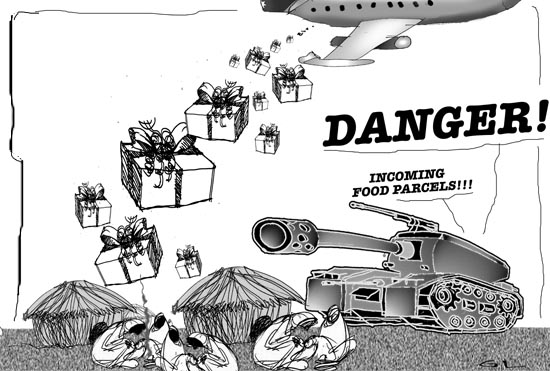Search
Democracy Links
Member's Off-site Blogs
sweet charity...

Since the end of the cold war, the business of humanitarian aid has flourished. During the proxy wars fought by African and Asian states backed by the Soviet Union, China and the USA, aid agencies found it very difficult to gain access to war zones. But with the end of the Soviet Union, suggests Polman, regions afflicted by war became something like charity enterprise zones, creating a massive expansion in the aid industry. Back in 1980 there were about 40 INGOs (international non-government organisations) dealing with Cambodian refugees on the Thai border. A decade later, there were 250 operating during the Yugoslavian war. By 2004, there were 2,500 involved in Afghanistan.
All too frequently, according to Polman, the result is not what it says in the charity brochures. She cites a damning catalogue of examples from Biafra to Darfur, and including the Ethiopian famine, in which humanitarian aid has helped prolong wars, or rewarded the perpetrators of ethnic cleansing and genocide rather than the victims. Perhaps the most striking case in the book deals with the aftermath of the genocide in Rwanda in which the Hutu killers fled en masse across the border to what was then Zaire (now the Democratic Republic of Congo). There, in Goma, huge refugee camps were assembled and served by an enormous array of international agencies, while back in Rwanda, where Tutsi corpses filled rivers and lakes, aid was not so focused. The world was looking for refugees, the symbol of human catastrophe, and the refugees were Hutus. This meant the militias that had committed the atrocities received food, shelter and support, courtesy of international appeals, while their surviving victims were left destitute.
Worse still, Polman believes the aid enabled the Hutu extremists to continue their attempt to exterminate the Tutsis from the security of the UNHCR camps in Goma. "Without humanitarian aid," she writes, "the Hutus' war would almost certainly have ground to a halt fairly quickly."
http://www.guardian.co.uk/society/2010/apr/25/humanitarian-aid-war-linda-polman
- By Gus Leonisky at 25 Apr 2010 - 7:03pm
- Gus Leonisky's blog
- Login or register to post comments
Recent comments
1 day 18 hours ago
1 day 20 hours ago
1 day 20 hours ago
1 day 20 hours ago
1 day 21 hours ago
1 day 21 hours ago
1 day 21 hours ago
2 days 5 hours ago
2 days 5 hours ago
2 days 7 hours ago